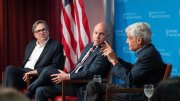After two years in limbo, the Center for International Development (CID) has at least a temporary new lease on life. The appointment of Kamal professor of public policy Mark R. Rosenzweig, a development economist, as the center's director suggests a renewed effort to engage Harvard scholars in interdisciplinary research on problems of sustaining growth in less developed nations.
CID, set up at the Kennedy School of Government (KSG) in 1998 to complement the economic, political, and social consulting services of the Harvard Institute for International Development (HIID), was envisioned by its founder, economist Jeffrey D. Sachs, as a think tank and academic training venue. After he left for Columbia in 2002, the center was run by a faculty committee (see "Developmental Troubles," September-October 2002, page 63) and then briefly by Cabot professor of public policy Kenneth S. Rogoff (see "Harvard Portrait," January-February, page 51). Thus the center has effectively been in a holding pattern for two years, even as progress has been made in launching other interdisciplinary programs, including one pertinent to development issues the University's global health initiative (see "Global Research in Health Sciences," January-February, page 62).
Rosenzweig came to Harvard from the University of Pennsylvania in 2002, attracted, he says, by the depth and range of development expertise among faculty members at the University, MIT, and elsewhere in Greater Boston. "It would be good if there were an organization that could pull them all together," he says, while acknowledging that doing so will not be easy. In the wake of serious problems in managing its work in Russia, HIID was closed in 2000, following a faculty review that concluded its far-flung advisory services did not complement teaching and research priorities (see "HIID, Dismantled," March-April 2000, page 77). CID itself currently lacks sustainable funding and, in the view of the faculty oversight committee (on which Rosenzweig served), had failed to attract broad scholarly involvement.
Rosenzweig, an editor of the Journal of Development Economics, whose research interests span deforestation, low-birth- weight infants, labor mobility, and immigrant demographics, hopes to rekindle CID's research by addressing knotty problems in growth and sustainability.
One example is a new project on indoor air pollution: cooking fires have huge implications for millions of individuals' health and safety, and for use of forests. The search for new cooking techniques will involve technology, delivery of alternative fuels, and careful understanding of household behavior who cooks? and so might draw on Harvard expertise in environmental quality, health, economics, engineering, domestic architecture, anthropology, and infrastructure. Fresh ideas, Rosenzweig says, could have "global consequences, health consequences, development consequences."
Another inquiry involves labor mobility. Globalization, he says, commonly implies movement in goods, services, and financial capital. But the movement of people within and among countries is much less understood, and is barely encouraged. Aid is delivered to needy people where they live but they might benefit more from moving to areas of greater opportunity, a subject explored in some detail by his KSG colleague Dani Rodrik, Hariri professor of international political economy (see "Globalization for Whom?" July-August 2002, page 29). Rodrik and professors from other Harvard schools are now exploring this topic in a CID study. At the broadest level, Rosenzweig asks, "Should Africa do any agriculture at all?"
Spurring such scholarship is a matter of some urgency. CID's student programs, Rosenzweig says, are succeeding. Fifteen or so undergraduates typically receive research aid each summer, as do students pursuing the master's in public administration degree specializing in international development. CID also provides office space for more than a dozen doctoral students from diverse disciplines, and a limited number of fellowship grants, and hosts workshops and luncheon discussion series for all these students. Those activities, and the physical resources associated with faculty research, are depleting the center's initial endowment, transferred from HIID in 1998. At the current rate, plus help from President Lawrence H. Summers for 2004-2005, CID can continue for three years, Rosenzweig says. By that time, it will have to prove its worth as a "value-added" intellectual center able to secure additional funding.
For now, that appears a bet worth making. In the statement accompanying Rosenzweig's appointment on August 17, KSG dean David T. Ellwood, who took office six weeks earlier, spoke of "shap[ing] this vital and exciting area of research and further[ing] the education of our students." Rosenzweig himself says of Ellwood, whose work focuses on domestic policy, "He'll be heavily involved in assessing this. He's the opposite of skeptical."





